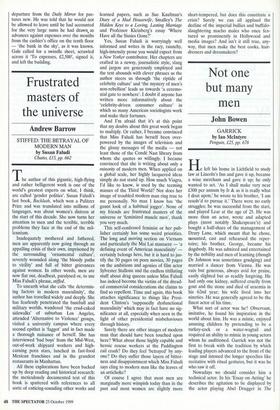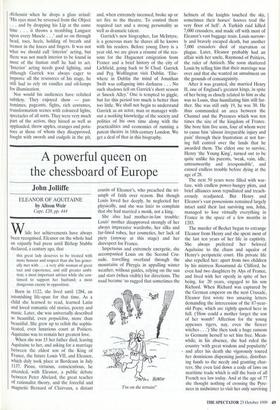Not one but many men
John Bowen
GARRICK by Ian McIntyre Penguin, £25, pp. 678 Rleft his home in Lichfield to study law at Lincoln's Inn and gave it up, became a wine merchant and gave it up; he only wanted to act. 'As I shall make very near £300 per annum by It & as it is really what I doat upon,' he wrote to his brother, 'I am resolv'd to pursue it.' There were no early struggles; he was successful from the start, and played Lear at the age of 25. He was more than an actor, wrote and adapted plays (most notably Shakespeare's) and bought a half-share of the management of Drury Lane, which meant that he chose, mounted, cast and rehearsed the reper- toire; his brother, George, became his dogsbody. He was admired and entertained by the nobility and men of learning (though Dr Johnson was sometimes grudging) and married a dancer from Vienna. He was vain but generous, always avid for praise, easily slighted but as readily forgiving. He had only one kidney, suffered cruelly from gout and the stone and died of uraemia in his 62nd year; his wife lived into her nineties. He was generally agreed to be the finest actor of his time.
What sort of actor was he? Observant, imitative, he found his inspiration in the world about him. He was a mimic, enjoyed amusing children by pretending to be a turkey-cock or a water-wagtail and required an ability to mimic in young actors whom he auditioned. Garrick was not the first to break with the tradition by which leading players advanced to the front of the stage and intoned the longer speeches like recitative with ritual gestures, but it was he who saw it off.
Nowadays we should consider him a technical actor. In his 'Essay on Acting' he describes the agitation to be displayed by the actor playing Abel Drugger in The Alchemist when he drops a glass urinal: 'His eyes must be reversed from the Object
• . . and by dropping his Lip at the same time . . it throws a trembling Languor upon every Muscle . . .' and so on through head, toes, heels, holding of breath and tremor in the knees and fingers. It was not what we should call 'interior' acting, but there was not much interior to be found in most of the fustian stuff he had to act. 'Interior' acting needs good lighting, and although Garrick was always eager to improve all the resources of his stage, he still had to rely on candles and oil-lamps for illumination.
Nor would his audiences have relished subtlety. They enjoyed show — pan- tomimes, pageants, fights, rich costumes, transformation scenes with coloured lights, spectacles of all sorts. They were very much part of the action, they hissed as well as applauded, threw apples, oranges and pota- toes at those of whom they disapproved, fought with swords and cudgels in the pit, and, when extremely incensed, broke up or set fire to the theatre. To control them required tact and a strong personality as well as dramatic talent.
Garrick's new biographer, Ian McIntyre, is a generous man: he shares all he knows with his readers. Before young Davy is a year old, we are given a resume of the rea- sons for the Huguenot emigration from France and a brief history of the city of Lichfield, going back to St Chad. Garrick and Peg Woffington visit Dublin. 'Else- where in Dublin the mind of Jonathan Swift was collapsing into darkness . . . No such shadows fell on Garrick's short season at Smock Alley.' One is tempted to giggle, but for this period too much is better than too little. We shall not begin to understand Garrick as an actor, man or manager with- out a working knowledge of the society and politics of his own time along with the practicalities and economics of running a patent theatre in 18th-century London. We get a deal of that in this biography.



















































































 Previous page
Previous page